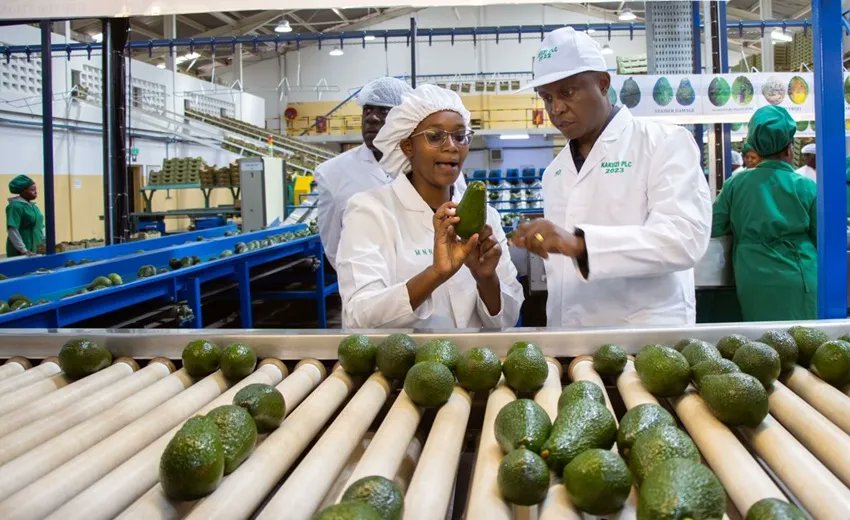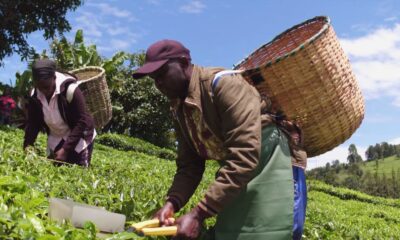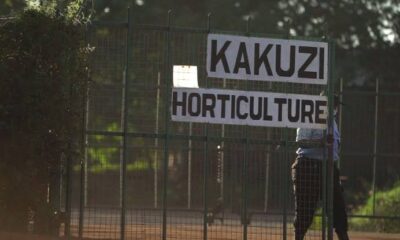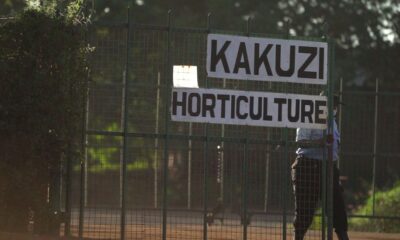Business
Kakuzi Investors Face Massive Loss as Land Commission Drops Bombshell Order to Surrender Quarter of Productive Estate
The land grab represents approximately 26 percent of Kakuzi’s total productive estate of 12,229 acres, sending shockwaves through the investment community and raising alarm bells about the future of one of Kenya’s oldest agricultural enterprises.

Shareholders in agricultural giant Kakuzi PLC woke up to devastating news on Wednesday morning as the National Land Commission delivered a crushing blow that could wipe out a quarter of the company’s productive landholdings and threaten its entire business model.
The commission has ordered the Nairobi Securities Exchange-listed firm to immediately surrender a staggering 3,250 acres to Murang’a County and vulnerable residents in what it terms a final settlement of historical land injustice claims dating back to the colonial era.
The land grab represents approximately 26 percent of Kakuzi’s total productive estate of 12,229 acres, sending shockwaves through the investment community and raising alarm bells about the future of one of Kenya’s oldest agricultural enterprises.
The timing could not be worse for investors. Kakuzi’s share price tumbled 3.67 percent to Sh400 by midday trading, though remarkably low volumes of just 215 shares suggest many shareholders remain unaware of the full implications of this catastrophic directive.
The company’s two major shareholders, UK multinational Camellia Plc with 50.7 percent and local businessman John Kibunga Kimani holding 33.35 percent, now face the prospect of watching billions of shillings in asset value evaporate overnight.
Kakuzi management issued a defiant statement declaring it will deploy every legal weapon in its arsenal to fight the order.
The company warned that any disruption to its agricultural resources will deliver a material negative impact on operations and earnings, potentially triggering widespread job losses across its estates.
The firm emphasized it has invested heavily in its landholdings and depends entirely on these assets to deliver shareholder value.
The scale of what Kakuzi stands to lose is truly staggering.
According to its latest annual report, the company has meticulously cultivated 1,410 hectares of macadamia, 1,117 hectares of avocado, 1,912 hectares of trees and 510 hectares of tea across its estates.
Losing 3,250 acres would decimate these carefully managed plantations and destroy decades of agricultural investment.
The National Land Commission’s directive follows years of bitter disputes with communities in Murang’a who have accused Kakuzi of illegally acquiring thousands of acres during Kenya’s colonial period.
The commission conducted an exhaustive investigation after receiving petitions from Kenyans claiming they were dispossessed of their ancestral lands.
The NLC’s orders go beyond just land surrender, requiring Kakuzi to hand over 3,200 acres to settle the most vulnerable claimants and an additional 50 acres to Murang’a County Government for public use.
Even more alarming for Kakuzi, the commission has ordered the company to address longstanding community grievances including lack of access roads to schools and other communal facilities.
The national government and Murang’a county authorities have been directed to coordinate implementation, including issuing titles and regularizing settlement schemes within what is currently Kakuzi land.
This represents the latest chapter in an escalating war against major agricultural landowners in Kenya’s fertile Central and Rift Valley regions. Del Monte has already been forced to surrender 1,312 acres to Murang’a County and 697 acres to Kiambu County.
Kakuzi’s sister company, Eastern Produce Kenya Limited, faces similar pressure to cede land from communities in Nandi County where it operates tea plantations.
The parent company Camellia has maintained that these land claims have been repeatedly refuted through Kenya’s legal system, but the NLC appears unmoved by previous court determinations.
In earlier directives, the commission had already ordered that Kakuzi’s leases should not be renewed until historical injustice claims are resolved and that any 999-year leases must be converted to 99 years.
Adding another layer of complexity, some community members living around Kakuzi estates have been strategically buying shares in the company through the Kakuzi Neighbourhoods Development Foundation, which now holds a 2.52 percent stake worth Sh197.7 million at current market prices.
This tactic appears designed to gain access to annual general meetings and other shareholder forums where they can amplify their grievances.
For the roughly 1,400 retail investors who hold the remaining shares in Kakuzi, the situation presents an impossible dilemma.
Daily trading volumes rarely exceed 300 shares, meaning liquidity is extremely limited for anyone wanting to exit their positions before the legal battle plays out.
These small shareholders now find themselves trapped in a company facing an existential threat to its core assets.
Legal experts suggest the fight ahead will be long and expensive. Kakuzi must navigate Kenya’s complex land laws while simultaneously trying to maintain agricultural operations and investor confidence.
The company faces the real possibility that even if it wins in court, the legal fees and operational disruptions could inflict serious financial damage.
The broader implications for Kenya’s agricultural sector are equally troubling.
If the NLC’s orders stand, they will establish a dangerous precedent that could embolden similar land claims against other large commercial farms across the country. Foreign investors in Kenya’s agricultural sector will be watching nervously, knowing their own landholdings could be next on the chopping block.
Kakuzi’s statement that it will use all legal means to preserve shareholder rights suggests a scorched earth legal strategy is coming.
The company has no choice but to fight, as surrendering a quarter of its productive land would essentially destroy the business model that has sustained operations for generations.
As this drama unfolds in Kenya’s courts, Kakuzi investors face an agonizing wait to discover whether their holdings will retain any value or whether they have been caught in an unstoppable wave of land redistribution that will reshape the country’s agricultural landscape forever.
Kenya Insights allows guest blogging, if you want to be published on Kenya’s most authoritative and accurate blog, have an expose, news TIPS, story angles, human interest stories, drop us an email on [email protected] or via Telegram
-

 News2 weeks ago
News2 weeks agoTHE FIRM IN THE DOCK: How Kaplan and Stratton Became the Most Scrutinised Law Firm in Kenya
-

 Economy2 weeks ago
Economy2 weeks agoIran Demands Arrest, Prosecution Of Kenya’s Cup of Joe Director Director Over Sh2.6 Billion Tea Fraud
-

 Grapevine1 week ago
Grapevine1 week agoA UN Director Based in Nairobi Was Deep in an Intimate Friendship With Epstein — He Even Sent Her a Sex Toy
-

 Business2 weeks ago
Business2 weeks agoKPC IPO Set To Flop Ahead Of Deadline, Here’s The Experts’ Take
-

 Politics2 weeks ago
Politics2 weeks agoPresident Ruto and Uhuru Reportedly Gets In A Heated Argument In A Closed-Door Meeting With Ethiopian PM Abiy Ahmed
-

 Investigations1 week ago
Investigations1 week agoHow Mexico Drug Lord’s Girlfriend Gave Him Away
-

 Business2 weeks ago
Business2 weeks agoSafaricom Faces Avalanche of Lawsuits Over Data Privacy as Acquitted Student Demands Sh200mn Compensation in 48 Hours
-

 Investigations2 weeks ago
Investigations2 weeks agoKenya’s DCI Opens Probe on Russian Man Who Secretly Filmed Sex Escapades With Women — But There’s a Slim Chance They’ll Ever Get Him























